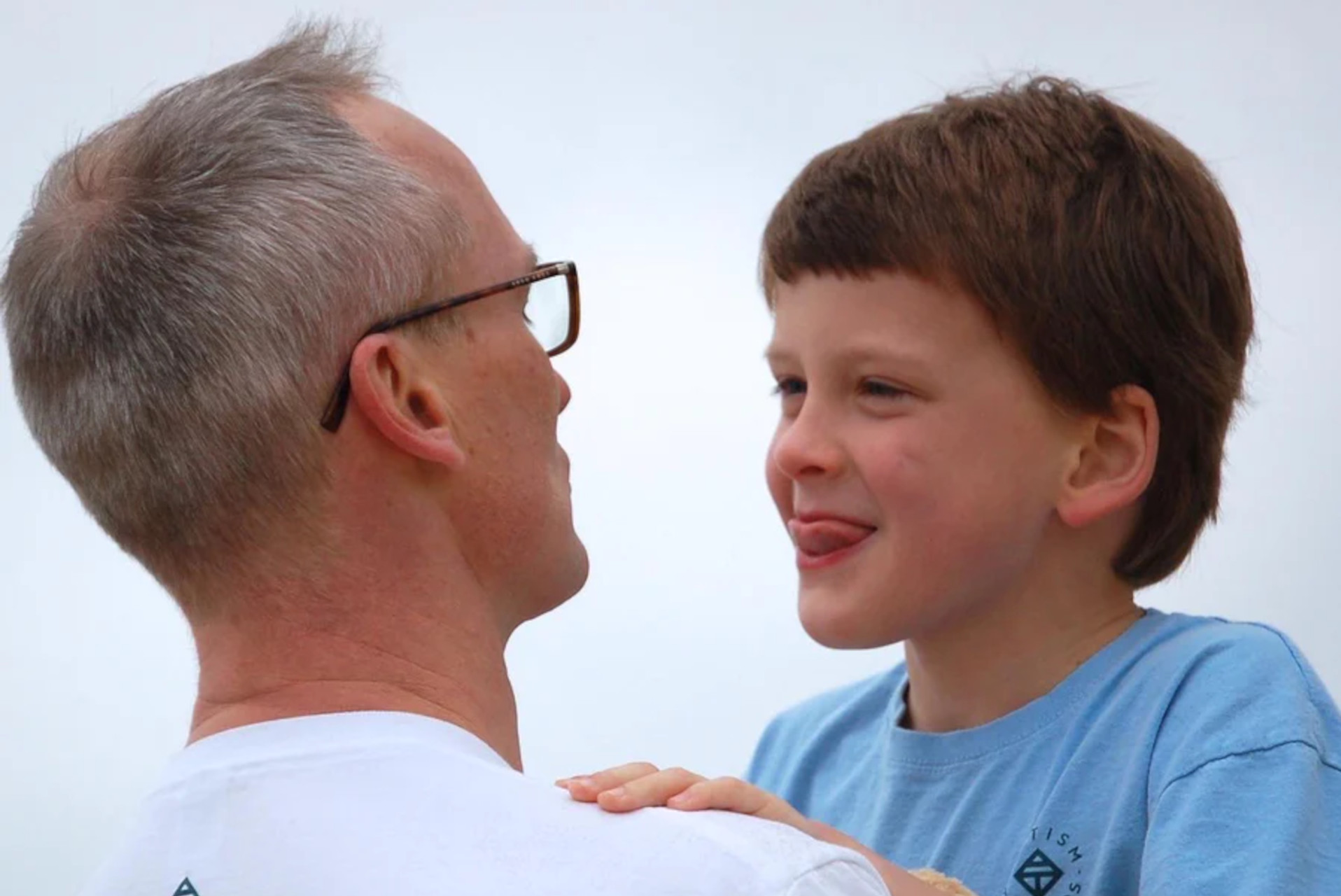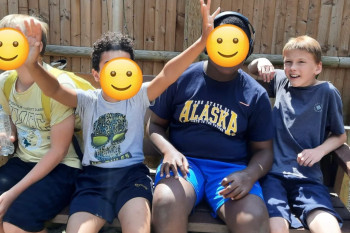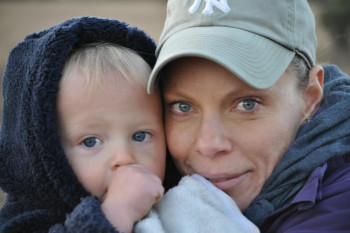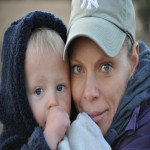There is a classic conversation killer that happens relatively often in my life with my autistic son Henry & it goes something like this. I'll be in a park or out & about somewhere with Henry & meet another Mum or parent who may or may not say Hi to Henry who obviously won't answer or even acknowledge her that can also often have it's own flash of judgement sometimes, and the chat will go something like...
me: "Oh, this is Henry, he's autistic" (so she gets a heads-up about the no eye contact etc.)
her: "Oh, yeah, well, great, um, what school does he go to?"
me: "He's nonverbal so he goes to an autism specialist school"
her/me: brief exchanges about where, what, how etc.
her: "but he likes his school & he has friends?"
me: "uh, no friends really & I don't know if he likes school, he can't tell me"
her: silence &/or immediate topic change &/or excuse to leave.
So, somehow, by telling the truth, I have made her feel bad?! huh?! I think people sometimes gloss over the word 'nonverbal' since it's not common place, or it doesn't quite sink in but, genuinely, my son is not able to tell me how his day was at school, ever. On a very broad level I could say he is ok at school (the 3r done at age 12), has accepted it & enjoys part of his day sometimes, hopefully but, I don't think he loves it. And as for friends, he doesn't need them, his brain is different, it doesn't mean he doesn't have meaningful & loving & fun times with significant others/adults in his life.
I guess I should be more polite & brush over it & say that yes, he loves his school. I just can't though...I'm not intending to be mean, I just do want the penny to drop, for them to understand just what nonverbal autism means & to learn something &/or ask more appropriate questions to learn even more. How else are we going to get people to stop simply ignoring my son thinking he wants to be alone & has no intelligence or interest because he doesn't talk. I want 'her' to go home & think abut what even just a morning would be like if her own child did not respond to or answer or talk to her. For example:
Mum : "Morning sunshine, how did you sleep?"
nonverbal child: "..."
Mum: "What would you like on your toast for breakfast?
nonverbal child: "..."
Mum: Have you been to the toilet?"
nonverbal child: "..."
Mum: "Are you ready for school?"
nonverbal child: "..."
Mum: "What would you like for your birthday?"
nonverbal child: "..."
Mum: "What's Mummy's name?"
nonverbal child: "..."
Mum: "How old are you?"
nonverbal child: "..."
Mum: "Where do you live?"
nonverbal child: "..."
Mum: "Tell me baby, where does it hurt?"
nonverbal child: "..."
NOW she maybe gets it!

Whilst I'm harping on about meeting people who do not know much about autism, I'll give some tips, just 1 to 5 (there are way more I'm sure) on what not to say to or ask the parent of an autistic child. I am never offended by these, I'd rather people asked a question using the wrong language than not ask a question at all. Plus, if the shoe were on the other foot I can imagine myself asking or saying exactly the same things. It's ok, we all make mistakes, just as long as we are willing to learn & those teaching us don't get angry about it!
What not to say, 1 to 5:
1. "So, on a scale of 1 to 10, how bad is he?" I love this one, it's hilarious. And I get that it is well-meaning ie the person is trying to set their expectations about my child & on a positive note has clearly heard autism is a vast spectrum of things. Just, oh you know, perhaps not the best language used here.
2. They hear about your son & then say to you, the parent "I'm so sorry for you". Arrghh, there is NOTHING to be sorry for. He is my flesh & blood, he is my son, he is human, he is loved, he is enough, he is exactly who he is meant to be. I don't say "I'm so sorry for you" when your son becomes a ballet dancer when all you wanted was for him to play rugby! Ok, that was a bit shouty, apologies.
3. "Oh, my sisters cousins son is autistic" Oh, really, is he? The problem with this is that it now it leaves me, already very knowledgable on autism, asking this person all about their sisters cousins son when actually, it is they who should be asking me all about my son & his autism, taking the opportunity to learn more.
4. "Well, they are meant to be extremely intelligent & genius at things like maths or art or a special interest. Does your son have this?" Errr, no, no maths skills yet, we're hopeful for art & his current squiggles & nope, no special interest. The chances of autistic people being savant (genius) are just as slim as that of neuro-typical people being proper genius in IQ....v v v v little.
5. "He seems absolutely fine though, really, he's great, just relax, come & sit & chill" He is fine because I am working ultra hard to make sure he is fine, for his benefit & yours. I have to be hyper vigilant, I am happy to do it because I want Henry to be able experience his wider family & cope with the environment changes & I want to see my own family & friends too, with Henry as part of our family.

An important thing to mention here too, is that just because my son is highly (my new word 'highly' much more positive than 'profound' or 'severe') autistic doesn't mean my life as a parent & Henry's is so much harder than other parents & their verbal autistic children. Not at all. So little of what we all, as neuro-typical humans communicate is with actual words after all. It is in fact less than 40%! I mean just think about how often we all say things we don't mean & mean things we don't say. It is this & all the un-spoken communication that any autistic individual with have difficulties with in varying degrees.
An amazing podcast episode to recommend that is titled "Autism is a journey, NOT a verdict" by "Uniquely Human, the Podcast". Here we learn how negative some of the language used around autism has been in the past & how it has come from a place of fear, concern & uncertainty. Autism is a developmental journey & your autistic child may reach the same outcomes in adulthood as others, they just took a different path or longer to get there eg they didn't speak until they were 5 or they didn't attend their first birthday party until they were 9. Thankfully, we are re-learning from the voices of actually autistic individuals today & there are words and language that we should no longer be using.

It's complicated & I fear sometimes it pushes people away rather than drawing them in. I, for one, am never offended & happy to correct where needed. I am also learning every day too. Having previously felt as though we, as parents in particular have bigger fish to fry aka battles to fight than worry about how whether to say our child 'has autism' or 'is autistic' but, I have completely changed my thinking now. If it matters to a person how they are addressed eg preferring 'autistic person' rather than 'person who is autistic' then it should matter to us. We need to be brave in asking & polite in informing/correcting. So, no more 'has autism' or 'autism parent' or 'autism mom' or words like 'expose' your child to the world or 'obsession' when it is actually passion, or negative words such as 'profound' or 'severe' or 'high/low functioning' or even 'Aspergers'. Even the word 'behaviours' is not great. A person is autistic or they are not. And we are parents of autistic children. I keep learning & I am sure more changes will come, its important we get it right.






